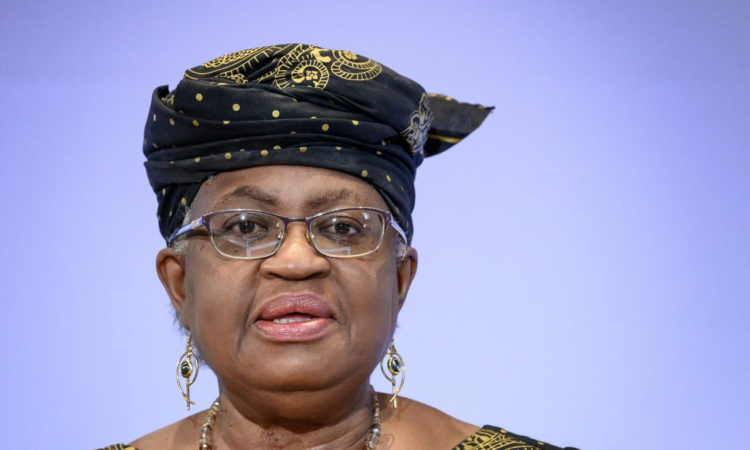
World Trade Organization Director-General Ngozi Okonjo-Iweala. (Photo by Fabrice COFFRINI / AFP)
•Set agenda for new minister, want review of space, nuclear plants, renewable energy programmes
Scientists have made recommendations on how Nigeria can match the United States (U.S.), United Kingdom (U.K.), China and Japan in development of Science and Technology.
Scientists have also set agenda for the new Minister of Science, Technology and Innovation, Senator Adeleke Mamora and the Minister of State, Ikechukwu Ikoh, on how to use the sector to ensure national development and prosperity. They said Nigeria is making some contributions to the development of Science and Technology (S&T), but is underperforming, relative to her abundant human capital.
The Federal Government had in August 6, 2021 renamed the Ministry of Science and Technology as Ministry of Science, Technology and Innovation.
The Federal Ministry of Science, Technology and Innovation (FMSTI) has the mandate to facilitate the development and deployment of science and technology apparatus to enhance the pace of socio-economic development of the country through appropriate technological inputs into productive activities in the nation.
A Professor of Medical Microbiology and Immunology, a Harvard Fellow in Microbiology and Molecular Genetics, and a Fellow of the New York Academy of the Sciences, Prof. Boaz Adegboro, told The Guardian that the first step in technological development is research. “When I was in Harvard University, I worked in John Ender’s Research Building, this building had 21 floors above the ground, and two below. All the floors were designed for research into human diseases. Within the space of 2.5 years, they put up another one of the same height, but with three floors under the ground, all designated for research. So I went to Ken McIntoch, the Chief of Infectious Diseases, and asked him why they were putting so much effort into research. He said ‘America is on top of the world, and to retain that position we have to be the first to make new discoveries and put them into practice’,” Adegboro said.
He said Harvard University also boasts of the Dana Faber Cancer Research Institute and this building has 26 floors above the ground, all developed solely for cancer research.
Adegboro said Microsoft is very successful because it has a large research team. He said this consists of young scientists who are employed to review existing literature on current issues related to software development. “They then try to first reproduce those works and then to improve on them. Their supervisors review the activities of those researchers from time to time. New improvements are then used to upgrade Microsoft programmes as often as possible,” he said.
The scientist said there should be linkage with industries, especially in drug and vaccines development. He said Universities everywhere give research topics to their students for Masters, Doctoral and Post-Doctoral programmes. Adegboro said the results of such dissertations and theses are shared with pharmaceutical industries that try to produce the new drugs and vaccines. “The industries then conduct animal and human clinical trials. These are finally followed by advertisements and sales of the drugs and vaccines,” he said.
Adegboro said such was the cooperation between Oxford University and AstraZeneca Pharmaceutical Company for the development of the Oxford–AstraZeneca COVID-19 vaccine, a viral envelope vaccine codenamed AZD1222, and sold under the brand names Covishield, Vaxzevria, AstraZeneca, AstraZeneca COVID-19.
Adegboro recommended copying technologies from other climes. “When I was in United Kingdom (U.K.) for my graduate studies, we noticed that a good number of Japanese scientists were not taking part in final degree examinations. They just went through the course works, bought British cars and returned to their country with their cars. Apparently they went home and sold their cars to manufacturing industries that dismantled them and improved on the strength and mechanics of the cars,” he said.
Adegboro added: “Today we see that Japanese cars are amongst the most efficient and durable cars in the world. Even United States of America (USA) invited Toyota Japan to produce their brand in USA.
“Someone may frown at the issue of copying technologies. But you cannot improve on any technology if you cannot first reproduce the existing ones. Then you proceed to modify them to get your own brand.”
Minister of State for Health, Dr. Olorunnimbe Adeleke Mamora
The microbiologist also said it is possible to purchase technology. “For example, the Moderna COVID-19 Vaccine is an mRNA vaccine. It was developed following the outbreak of the current pandemic of COVID-19. Some researchers have the copyright for the technology and are willing to sell the technology to developing countries to control the deadly pandemic,” he said.
According to the New Partnership for Africa’s Development’s (NEPAD) African Innovation Outlook (2010), South Africa produced over 86,000 scientific papers – about 37 per cent of the total research output of 19 African countries surveyed between 1990 and 2009; Egypt produced nearly 60,000 – about 27 per cent of output. Nigeria produced 27,743 papers (or 12 per cent of the total output) – about one-third of South Africa’s output.
Similarly, South Africa was able to secure more than 1,000 patents in 2010 alone, according to data obtained from the World Intellectual Property Organisation (WIPO); whereas, Nigeria secured only 18 patents in the last eight years. This is unbelievably low.
The Guardian investigation revealed that most of the agencies in the S&T ministry are barely meeting their mandates because of poor funding.
Meanwhile, stakeholders have called on the new science and technology minister to address worries about the widespread hazardous incidents involving nuclear reactors in advanced countries. Nigeria’s plan to build nuclear power plants has raised safety concerns, given the fact that the government has demonstrated a lack of capacity to manage ordinary gas-powered and hydro plants as evidenced in the sale of the country’s power assets.
The International Atomic Energy Agency (IAEA) had obviously endorsed the nuclear power project, but has played safe by effectively pushing the responsibility for the safety of the proposed plants to the doorstep of Nigeria.
Also, stakeholders have called on Mamora to address the myriad of problems surrounding the Nigerian communications satellite, popularity known as NigComSat-1, the multi-million dollar communication satellite, which spanned out of control just 18 months after launch.
The satellite, which was first launched into the orbit on May 13, 2007, cost the Federal Government N34 billion and the China Great Wall Industry Corporation executed the contact.
It was expected to provide broadband Internet and communications for government agencies.
They said although the satellite was re-launched in December 2011, with a lifespan of 15 years, the NigComSat-1 was ‘lying idle in space.’
They expressed disbelief that the satellite had remained idle in space at a time that Nigeria was facing multiple communications challenges, including the high cost of Internet.
They called for an investigation into the inter-agency rivalry between the National Space Research and Development Agency (NARSDA) and the Nigeria Communications Satellite Limited, said to be the reason the satellite was idle.
The stakeholders observed that despite the enormous communications potential of the NigComSat-1, coupled with its 28 active transponders and 12 redundant transponders as payloads, Nigeria’s NigComSat-1 has not been put to optimum use since 2011 when it was re-launched.
They said that when put to use, the satellite could conveniently support over 168 television stations simultaneously and each television programme could be broadcast in three or four different languages concurrently.
They said if put to its optimum use, NigComSat-1 will enhance security intelligence reporting, particularly as Nigeria battles to end the problem of insurgency and terrorism in the North East amongst other benefits.
Stakeholders have also charged Mamora on the development of renewable energy sources. They said alternative energy sources are at present the only panacea that will ‘bail the cat’ as seen practised by many other countries including Kenya, Ethiopia and South Africa.
They said long-term investments in renewable energies like solar and wind have the potential to contribute significantly to the electricity deficiency.
Indeed, the theoretical framework of the energy policy outlined by the Nigerian government seems promising, but there is a discontinuity, however, between implementation and theory.
Ikoh
On the way forward, a study published recently in Petroleum Technology Development Journal and titled “THE ROLE OF SCIENCE & TECHNOLOGY IN NATIONAL DEVELOPMENT: The Miracle of Malaysia and the Future for Nigeria” concluded: “In this paper we have discussed some ideas on the role of Science and Technology in the national development of Nigeria with an examination of Malaysia as a case history. Clearly, and incontrovertibly, technology is the engine of growth.
Within this framework, business and industry are the drivers, government is the catalyst and academics are the fuel. Technology-based developments can occur only with concerted efforts to revitalise education, develop personnel, and create integrated industries that will involve close collaboration between government, industry/business and academia.
“It is the Malaysian model that we here advocate for Nigeria, a model whose success in the world is incontrovertible and admirable.
“When I went to Malaysia in 1991, PETRONAS was a US$5.7 billion local company, but today it is No 93 in the list of the world’s 500 fortune companies and diversified with over 100 upstream and downstream companies, including aircraft manufacturing division.
“It now operates in over 30 countries of the world, providing leadership in oil and gas exploration, production and petrochemical businesses. If we can imbibe the diligence and discipline of Malaysia, we can duplicate their stunning success and with reliance and focus on science and technology, can achieve the nation’s vision 20-2020.”
On the way forward, former Minister of Finance and Director General of World Trade Organisation (WTO), Dr. Ngozi Okonjo-Iweala, in a paper titled “Science and Technology – The Key to Nigeria’s Transformation” recommended the following: “Policy makers at all levels in Nigeria need to be keenly aware that few countries can achieve development goals of economic diversification, food security, improving health systems, cleaner energy, generating wealth and jobs, and reducing absolute poverty, without the scientific, engineering, and technical capacity to handle these challenges.
“In the first instance, there is a need for an overarching national strategy for S&T and innovation: a strategy that will restructure our S&T sector for greater coordination, communication, and policy harmonisation. I am happy that the Steve Oronsaye Committee, having looked into this, came up with the idea that the government should establish a single point of research funding to promote synergy and create an efficient and effective platform for managing research.
“Secondly, given the government’s limited resources, the chances of increasing allocation to the S&T sector are rather slim in the short to medium term. This is why we need to focus our research efforts and expenditure on the few areas where we have comparative advantage – areas like agriculture, petrochemicals, renewable energy, and mining, to mention a few.
“Thirdly, more effective partnerships between the public and private sector should be established. In developed countries, R&D is mainly driven by the private sector. In South Africa, they contribute 42.7 per cent, whereas the government contributes only 36.4 per cent. So leveraging the private sector is crucial; any existing barriers to this kind of partnership should be removed….”
You must be logged in to post a comment.
Why are you flagging this comment?
I disagree with this user
Targeted harassment – posted harassing comments or discussions targeting me, or encouraged others to do so
Spam – posted spam comments or discussions
Inappropriate profile – profile contains inappropriate images or text
Threatening content – posted directly threatening content
Private information – posted someone else’s personally identifiable information
Before flagging, please keep in mind that Disqus does not moderate communities. Your username will be shown to the moderator, so you should only flag this comment for one of the reasons listed above.
We will review and take appropriate action.
Get the latest news delivered straight to your inbox every day of the week. Stay informed with the Guardian’s leading coverage of Nigerian and world news, business, technology and sports.
Follow Us
Celebrating its 5th Anniversary, the Seven Wonder Woman Awards presents nominees across sectors such as STEM, Healthcare, Sports, Beauty, Wellness, Social Impact, Media, Arts, Entrepreneurship, and more.
VOTE FOR WONDER WOMEN now, one woman per category!
Learn more







